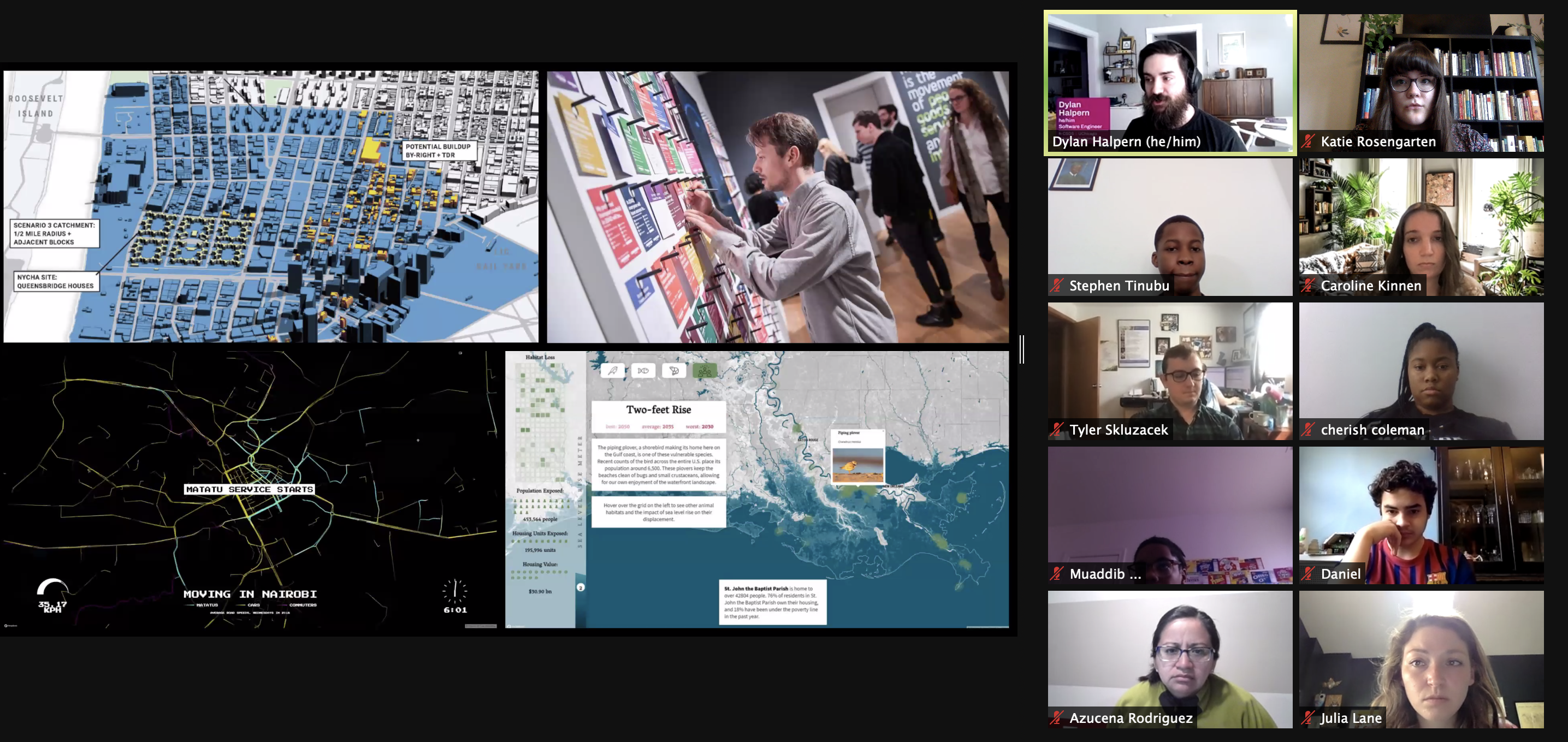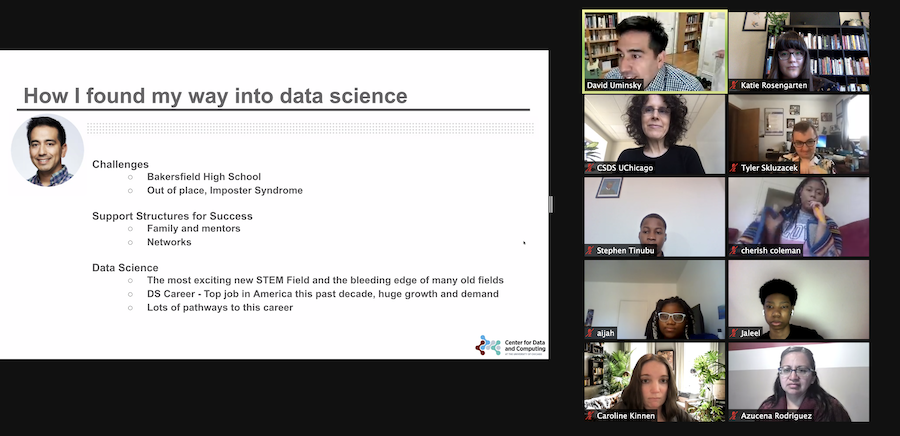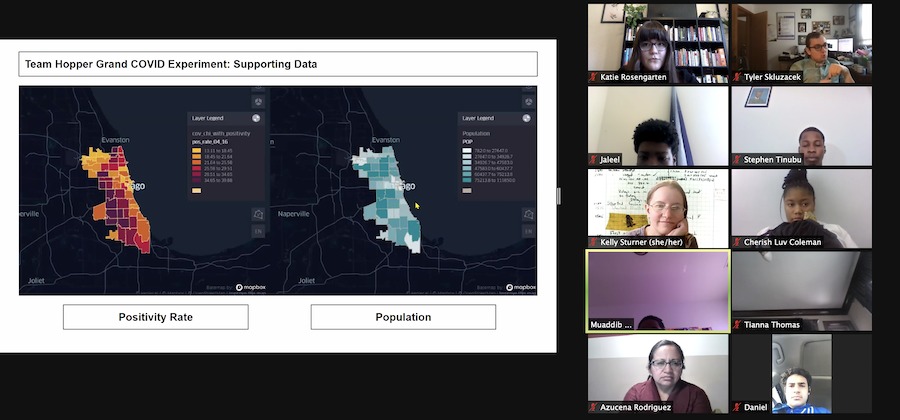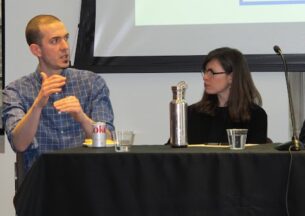First-Ever Data4All Workshop Nurtures Future Data Scientists From Chicago’s South Side

The job market of today and tomorrow has almost limitless demand for people with computer and data science expertise. But in many high schools, access to these disciplines remains limited to introductory courses. In Chicago Public Schools, the CS4All initiative seeks to integrate CS education at all levels from kindergarten through high school, but many students seek more advanced training to unleash their potential in this growing field.
The Data4All workshop — a joint project of the Center for Data and Computing, Argonne National Laboratory, and Fermi National Accelerator Laboratory — hopes to fill that need by opening a window to data science for high school students on Chicago’s South Side. In the program’s first-ever workshop, held over spring break, a group of seven high school students learned about the basics of data science, how to think critically about data, and the various career pathways available to them with computational skills.
Funded through the AI + Science program by the University of Chicago’s Joint Task Force Initiative and the UChicago Office of Research and National Laboratories, and supported by the Argonne in Chicago Initiative, the workshop united three scientific regional powerhouses to increase awareness of the data science field within South Side youth communities.
Students from Kenwood Academy, Hyde Park Academy, and the University of Chicago Charter School Woodlawn Campus learned from faculty, students, and researchers at UChicago, Argonne, and Fermilab about the power of data to answer important questions in science and society and bring about positive change. Throughout the week, the students applied their new knowledge in group projects using real COVID-19 data, studying the effects of the pandemic across Chicago neighborhoods and demographic groups.
“The main goal of the Data4All workshop was to get the students hooked on data science, and then show them a plethora of pathways through which they can pursue it further, because there really is no one way to go into data science,” said Katherine Rosengarten, administrative specialist for the Center for Data and Computing and co-organizer of the workshop. “We also want to encourage the students’ own interests and ways of thinking critically about data and data science, because we think that the field of data science needs these voices and new perspectives, especially from folks that are historically underrepresented.”
Students learned how to use Jupyter notebooks, Python programming, Kepler data visualization tools, and other technical skills. But more broadly, they learned how to access and work with large datasets, formulate research questions, and think computationally, skills that are applicable to a wide range of fields from scientific research, technology, and finance to art and video game development.
So much of the computer science that students experience in school lacks authenticity,” said John Domyancich, Learning Center Lead at Argonne. “We really designed the curriculum in a way that the students could investigate a question through a deep dive into data, from many angles, and have autonomy and ownership of their work. The feedback that we got from the students was that they appreciated this approach as it helped them see how these skills could be a stepping stone to other questions they might have.”
Many Career Paths

In their virtual classroom, students heard from field experts such as Brian Nord, Associate Scientist at Fermilab, and Charles Macal, Senior Technical Advisor & Social, Behavioral, and Decision Science Group Leader at Argonne, who introduced the students to scientific concepts such as artificial intelligence in astrophysics and agent-based modeling for predicting the path of epidemics. David Uminsky, executive director of data science initiatives at UChicago, explained the research lifecycle and used their own pre-workshop survey responses as the first dataset they encountered, while Dylan Halpern of the Center for Spatial Data Science covered visualizing data and the overlaps between art and science.
But significantly, these sessions were equal parts scientific talk and open discussion of how each speaker found their way to a career in data science. The conversations dove into issues such as imposter syndrome and making your way in a field where women and minorities remain underrepresented. The researchers emphasized that there’s no single correct path to becoming a data scientist, and the field is broad enough to be applied to a vast multitude of interest areas.
“Academic careers, including science research, are often presented as recipes or algorithms — if you do this, then this will happen, and you'll get to this point,” Nord said. “However, while many of us are seen to have ended up at the same place — such as professor or research scientist — our journeys can be very different or may be considered non-traditional. It's important for people early on to get glimpses of what different careers and work lives look like. I hope they took away from our conversation that there are lots of ways to be a scientist in the world, and that they have people rooting for them, and we’re here for them when they need us.”
The message was reinforced by talks from Brian McCallister, Assistant Director of Admissions at UChicago who outlined the college admissions process, and Ashlyn Sparrow, Assistant Director of the Weston Game Lab at UChicago. Sparrow’s talk, in particular, resonated with students, who heard about careers in game design and how crafting games relates to research, computing, data, and creativity
“It was actually really fun,” said Aijah Welch, a freshman at Hyde Park Academy. “We learned what it was like to be a mayor for a day. So we had to make sure the roads were safe, and there was no violence or drugs in our city. We had to make our world perfect to us, and it was an experience to see that one little thing can just change everything in what we do in the world.”
Final Projects Strike Home

The week’s curriculum, designed by Domyancich and Julia Koschinsky of the Center for Spatial Data Science with Jupyter infrastructure built by Jesse London and Tyler Skluzacek, was organized around the research lifecycle: forming hypotheses, working with data structures, analysis, visualization, and presentation. The students split into two groups — named for computing pioneer Grace Hopper and NASA legend Katherine Johnson — and worked throughout the week with data ranging from John Snow’s seminal 1854 cholera map to the ongoing COVID-19 pandemic, breaking down how the virus affected communities across Chicago.
The groups compared majority white, Black, and Latino neighborhoods by their COVID-19 rates, and broke down case numbers by job types, revealing relationships between economics, race, and susceptibility to infection. The projects were more meaningful, the students said, because they were studying their own communities, allowing them to see the real people and the true impact behind the numbers.
“It was something that we could relate to, something that was going on in real time,” said Daniel Neibel-Spruill, a sophomore at Kenwood Academy. “We could see what was going on, and it wasn’t just something made up for an exercise.”
Perhaps because of the immediacy, the Data4All students have continued to use the skills acquired during the workshop on personal projects in the weeks since. Neibel-Spruill, who will be spending the summer in Brazil, used a similar analysis to study where COVID-19 numbers were highest in that country to prepare for his visit. Welch has taken her new knowledge back to her computer science course, where she is building a website about food for the final project.
And while both students remain undecided about pursuing data science as a career, they feel that the ability to work with data will come in handy for whatever career path they choose. That’s the lasting effect that the workshop organizers hoped for: giving students the tools to realize their dreams, no matter what pathway they choose.
For Argonne, this program aligns well with their emerging Argonne in Chicago Initiative. “There are amazing people that live on the South Side, and we're just hoping to connect with them and tap into this immense potential,” said Meridith Brouzas, Manager of Educational Programs and Outreach at Argonne. “Working with these young people, it gives you more faith and confidence in our future. Their awareness of society, its problems, and also wanting to be a part of the solutions is really inspiring.”












